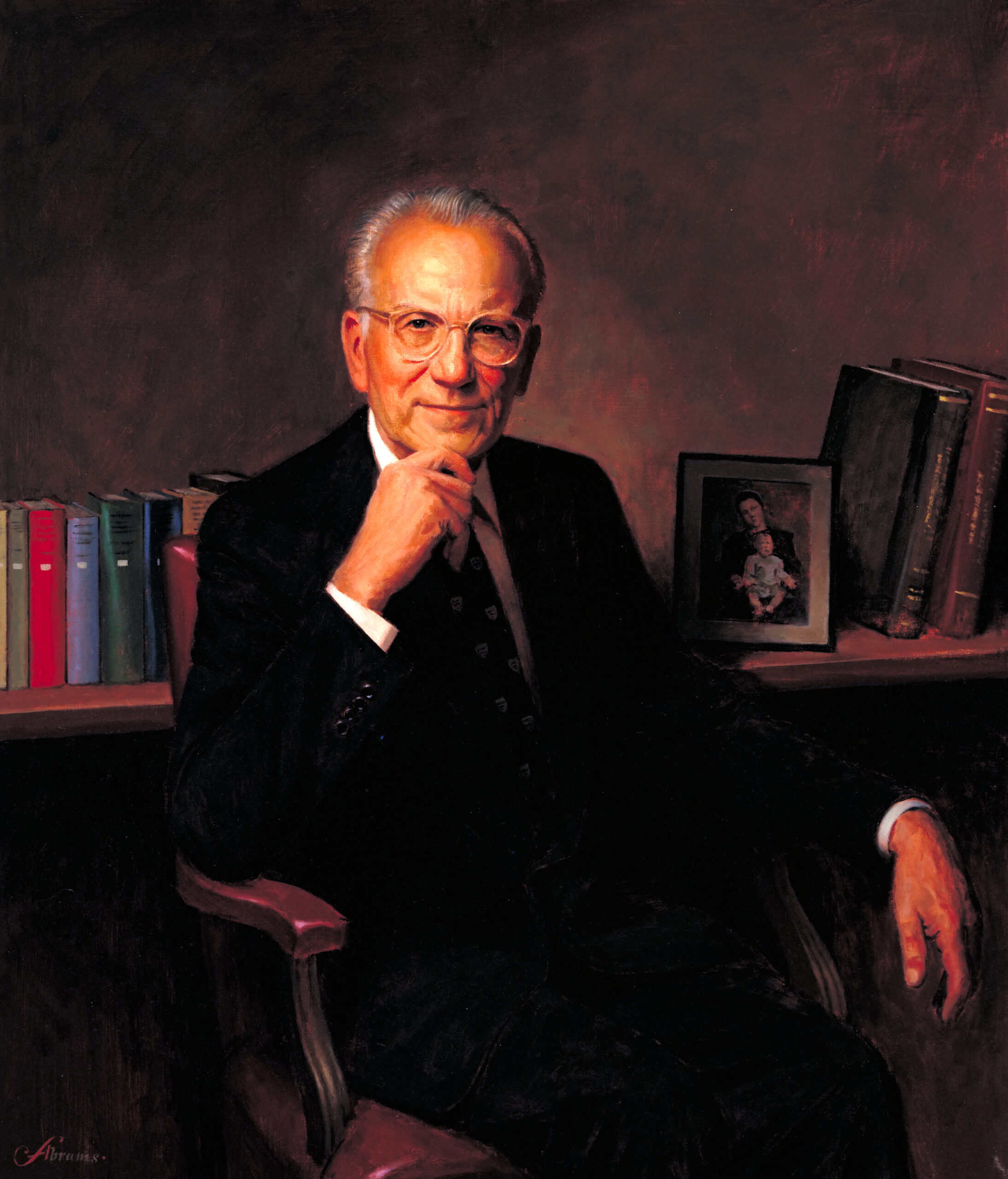Victor Almon McKusick

Victor Almon McKusick
- Artist:
- Herbert Elmtree Abrams
- Date:
- 1990
- Medium:
- Oil on canvas
- Dimensions:
- 41.5 x 35.5 in.
Victor Almon McKusick
1921-2008
McKusick, a founding father of the field of medical genetics, was born in Parkman, Maine. He attended Tufts University and the Johns Hopkins University School of Medicine, receiving his M.D. in 1946. Due to the shortage of physicians during World War II, McKusick never completed his undergraduate degree, instead continuing directly to an accelerated medical degree. His residency was likewise interrupted by required military service at Baltimore Marine Hospital in exchange for the Army’s funding of his education. McKusick completed an internship in 1947, and a residency in 1952, both in the Osler Medical Clinic at The Johns Hopkins Hospital.
Appointed as assistant in medicine at the Johns Hopkins University School of Medicine in 1947, McKusick simultaneously served as executive chief of the cardiovascular unit at Baltimore Marine Hospital from 1948 to 1950. His contributions to cardiology include adapting sound spectroscopy for analysis of heart sounds and authoring a unique catalog of heart sounds and murmurs in 1958.
Through his work in cardiology, McKusick studied Marfan syndrome, which led to his interest in medical genetics. In 1957, he was tapped to lead the chronic disease clinic which was at the time named for Joseph Earle Moore. While leading the Moore Clinic, McKusick changed its focus to the study of medical genetics, eventually using it to develop the division of medical genetics in the department of medicine. In 1973, he became the William Osler Professor and chairman of the department of medicine at the Johns Hopkins University School of Medicine and physician-in-chief of The Johns Hopkins Hospital. He held these posts until 1985, when he was named University Professor of Medical Genetics. McKusick also held joint professorships in epidemiology in the Johns Hopkins University School of Hygiene and Public Health and in biology at The Johns Hopkins University.
McKusick played a large part in introducing the field of medical genetics into the mainstream of academic medicine. He studied the whole range of inherited human disorders, then concentrated on mapping the location of genes on chromosomes and relating gene location to human disease. In 1966, he published the first edition of Mendelian Inheritance in Man, later published electronically as Online Mendelian Inheritance in Man (OMIM), which remains a definitive source of information on human genes and genetic disorders.
McKusick’s study of genetics among the Amish in Pennsylvania, Indiana, and Ohio is perhaps his most well-known research project. The study, begun in 1960, led to the identification of two recessive genetic conditions named Ellis-van Creveld Syndrome, and cartilage-hair hypoplasia, later named metaphyseal chondrodysplasia. McKusick published his findings from working with the Amish in 1978, titled Medical Genetic Studies of the Amish. He and his colleagues also expanded their knowledge of skeletal abnormalities by establishing ties with Little People of America, a support organization for people with dwarfism.
McKusick played a key role in expanding and organizing the field of medical genetics beyond Johns Hopkins. In 1960, McKusick founded and co-directed the Annual Short Course in Medical and Experimental Mammalian Genetics at the Jackson Laboratory in Bar Harbor, Maine. The Bar Harbor Course is an annual two-week course that more than 5,000 people have attended. McKusick also helped to organize an annual conference on the Clinical Delineation of Birth Defects starting in 1968. He led the Annual Course in Medical Genetics at the University of Bologna Residential Center in Bertinoro di Romagna, Italy in 1987.
McKusick published more than 600 books and articles on medicine, cardiology, history, and genetics. Showered with scores of national and international prizes, honorary doctorates and accolades during a professional career spanning more than sixty years spent entirely at Johns Hopkins, in 1973, McKusick was elected to the National Academy of Sciences. He was the founding president in 1988 of the Human Genome Organization, an international group whose goal is to promote mapping and sequencing of the entire human genome. McKusick was the recipient of the 1997 Albert Lasker Award for Special Achievement in Medical Science, the 2001 National Medal of Science, and the 2008 Japan Price in Medical Genomics and Genetics. In 1999, the Johns Hopkins University School of Medicine formed the McKusick-Nathans Institute of Genetic Medicine.
"*" indicates required fields
